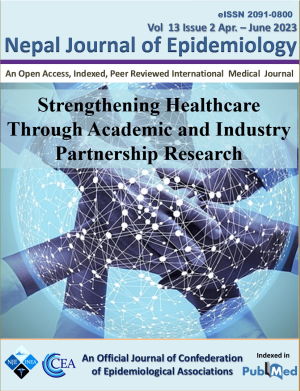The effect of Covid-19 on the mental health of the people in the Indian subcontinent: A scoping review
DOI:
https://doi.org/10.3126/nje.v13i2.52766Keywords:
Indian subcontinent, COVID-19, pandemic, anxiety, depression, mental healthAbstract
Background: Indian subcontinent has high mental heath burden and low resoueces to cope the mental health challenges. Assessment of impact of Covid-19 pandemic on the mental mental healthwould help to prioratize the resource allocations. We aimed to assess the impact of COVID-19 on the mental health of people in the Indian subcontinent.
Methods: We followed PRISMA guidelines and made a systematic serach in PubMed, Scopus, and Embase to identify the original studies assessing mental health conditions during Covid-19 pandemic in the Indian subcontinent.
Results: A total of 34 studies carried out between 2020 and 2022 was included in this review. The prevalence of anxiety disorders varied widely starting from 2.5% among residents of urban slum in North India to 53% Bangladesh, 21.7% in Pakistan. The prevalence of depression also varied widely starting from 3.5% North India to 29.8% in Pakistan. The prevalence of stress related problem varied from 18.3% in Pakistan to 59.7% in Bangladesh. Female gender, married status, health care workers, and mental illness were the important predicotrs for anxiety and depressive disorders.
Conclusion: The impact of Covid-19 pandemic on mental health of people living in Indian subcontinent varies widely based on study population and methods.Therefore, a cautious interpretation is needed while generalizing the study results.
Downloads
Downloads
Published
How to Cite
Issue
Section
License
Copyright (c) 2023 CEA & INEA

This work is licensed under a Creative Commons Attribution 4.0 International License.
- Upon acceptance Copyright on any research article is transferred in full to the Confederation of Epidemiological Associations (CEA) and International Nepal Epidemiological Association (INEA). The copyright transfer includes the right to reproduce and distribute the article in any form of reproduction (printing, electronic media or any other form).
- Articles in the Nepal Journal of Epidemiology are Open Access articles published under the Creative Commons CC BY License (https://creativecommons.org/licenses/by/4.0/)
- This license permits use, distribution and reproduction in any medium, provided the original work is properly cited.




